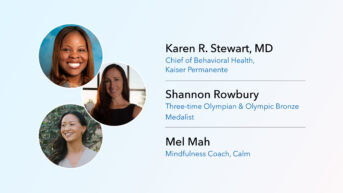Parents are struggling. In fact, according to the US Surgeon General’s 2024 advisory, on most days, 41% of parents said they can’t function due to stress, and 48% said their stress completely overwhelms them. And when parental stress persists for too long, it can escalate to burnout, endangering the health and well-being of parents and their children, too.
What can parents do to feel better before stress becomes chronic? That’s the question addressed in The New-Parent Puzzle: Managing Stress, Mental Health, and Maternal Well-being, a Calm webinar held in honor of Mental Health Awareness Month. The webinar featured Mel Mah, a Calm mindfulness coach, filmmaker, dancer, yoga instructor and mom; Shannon Rowbury, an Olympic Medalist, author, leadership consultant, sports broadcaster and mom of two; and Dr. Karen R. Stewart, a board-certified psychiatrist who serves as National Clinical Lead for Collaborative Care at Kaiser Permanente and the Chief of Behavioral Health at The Southeast Permanente Medical Group.
Here are 3 key takeaways from their discussion:
1. Chasing parental perfection is harmful and unnecessary
Parents are wearing themselves out by chasing perfection, the speakers agreed, but when it comes to parenting, perfection is an illusion.
“There comes a point where you’re working so hard to get things just right that you can become just overwhelmed and exhausted because of that,” Stewart explained. And trying to hit the mark just right for your kids all the time results in burnout. “Parental burnout is when you reach that state of physical and emotional and mental exhaustion that is caused by just being overwhelmed by all of the demands of parenting,” she said.
Feeling completely drained and lacking the energy to really spend time with your kids is one sign of burnout, according to Stewart. Another is feeling ineffective as a parent, which can show up as irritability or frustration with yourself, your children, or your partner. And ultimately, parental burnout can affect your sleep, decrease your appetite, or cause a number of physical symptoms such as headaches or muscle tension.
But burnout is preventable, “because striving for perfection is essentially an illusion,” added Mah. “There’s no such thing as being a perfect parent. It’s almost like that is the very thing that instigates burnout because we’re chasing something that’s unachievable.”
“Absolutely unachievable and unnecessary,” agreed Stewart. “It is necessary to be present and to learn from mistakes, but you are never going to be a perfect parent. So aspiring to that is just exhausting and unnecessary when we really think about good parenting.”
2. Embracing imperfection and vulnerability is key
Rather than chase parental perfection, we should embrace imperfection and be open about our flaws, suggested Mah. “That should be what we strive to show our kids. . .that your parents make flaws and mistakes, but this is how we can talk about it. This is how we can create more understanding and compassion with each other. It takes courage to be vulnerable, especially with our kids.”
Stewart echoed the importance of embracing vulnerability not just with our children but with ourselves and other parents. “First of all, just recognizing yourself that you have flaws and that’s okay, and then letting your kids know that’s okay, and talking to other parents about it can be really helpful.”
Talking with other parents can help you understand that you’re not alone and that others share some of the same parenting challenges—that things aren’t magically better in other people’s houses. “There are people out there who are having a hard time and they’re figuring it out, and you can figure it out together,” Stewart said.
Rowbury and Mah emphasized the need to be vulnerable with your partner, too.
“I’ve literally had some days where I’ve just had to say to my husband, ‘I feel sad,’” said Rowbury. “‘I don’t exactly know what it is, and I don’t expect you to fix it, but I just need a hug or I just need some space.’ Even if you don’t know the answer to the problem, but you feel that there’s something that’s not quite right, just even communicating that so they can understand where you’re coming from fundamentally helps have a better conversation, helps move you forward in a healthier direction.”
“That’s such an important point,” Mah responded. “To communicate doesn’t mean that you have to know exactly what the solution is or even what your feelings are, but just to start somewhere and leave it, that’s actually really inviting your partner to come into the conversation, and it’s having the bravery to express that.”
3. Focusing on what matters most and what you’re doing right is vital
“I would say 100% of [the parents who come into my office] have some parental guilt at some time,” said Stewart. “They feel like they did something wrong. They’re blaming themselves. They don’t feel like responsible parents.”
Comparing ourselves to other parents, judging our decisions about punishment, or feeling like we’re not spending enough time with our children are common parts of parental guilt that can be exhausting, Stewart explained. When we start to self-judge our parenting, we should remind ourselves of what really matters, she said.
“I ask them about the basics. Is your child safe? Have they had something to eat? Are they loved? . . .You can start there, then you can really start to say, okay, all the other stuff is sort of icing on the cake. . . .But if you’re doing those three, then you’re doing a really good job. And that can be a big thing to think about when you start to have that parental guilt sort of piling up on you.”
Focusing on all the things you’re doing right or even hitting out of the park, rather than blaming yourself for your mistakes, is really important, Stewart stressed. At the same time, make sure you take time for yourself without your kids, even if 30 seconds or a minute – to eat a piece of chocolate or just take a deep breath.
Finally, just “acknowledging how you feel can be tremendously helpful even when it feels bad to feel that way.” It’s human to have negative feelings about our children at times, but those feelings pass. “Just realizing that you’re human and you’re going to have those kinds of feelings can be really, really important,” Stewart said.
Treat yourself the way you’d treat your child who’s learning to walk—with encouragement and compassion. When the child falls down, you encourage them to get back up and keep trying. “‘Come on, you can make it!’ Using that kind of self-talk for ourselves when we get into situations can be really helpful,” she added.
“Everything we do is something that’s teaching our child,” said Mah. “So if we make a mistake or we falter, and we pick ourselves back up, we speak to ourselves compassionately. That’s what we’re teaching our kids as well.”
Rowbury shared a strategy she used as an athlete when she was judging her mistakes.
“We’re always thinking of what we could improve on, but what are three things that I did well and that I can take pride in? What’s one thing I can do better? And from there, what’s next? What do I want to carry forward with me into the days ahead? I find it really grounding and a really great opportunity to juice the most learning from any situation.”
Watch the full webinar on demand
For many more insights and words of encouragement—including the balance between discipline and fun and the importance of leaning on your community, staying in the present moment, and operating from a place of love—watch the full webinar on demand.
And check out some other Calm blogs related to parental and caregiver well-being:




